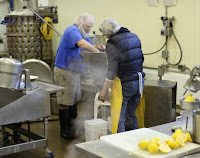Saturday, December 04, 2010
Farm Bulletin: Jam Session
The first time I tasted the preserves from Ayers Creek Farm, it was a jam made from the blackcap, a tiny blackish-blue berry whose shape is similar to a raspberry but with a shallower cup and much tinier drupelets. Spread on warm buttered toast it was a revelation, and I've since gone on to sample many more of their amazing preserves, each one the distilled essence of the fruit. This week contributor Anthony Boutard describes the process used in making them, and you can get some for yourself two Sundays a month through the winter at the Ayers Creek stand at the Hillsdale Farmers' Market.
In mid-November, we made our third run down to Elmira, a small town 105 miles south of Gaston. The sky was clear and Orion's belt twinkled low and clear in the early morning sky. We left 20 minutes early, hoping to arrive before our customary 9:06 arrival time. Bogged down in Corvallis, we arrived at 9:09. Upon entering the sparkling processing room at Sweet Creek Foods, it is clear that Paul has everything set up for the day's processing run. The deseeder is in the middle of the room. Stainless steel vats were filled with fruit that had been macerating in sugar for 36 hours. On the table stood a hand-cranked juicer, a case of organic lemons, a knife and cutting board.
Sweet Creek Foods is a small processing and bottling company operated by Paul and Judy Fuller. The facility is certified organic and the Fullers pack tuna, pickles, salsas and jams under their own label. They are also a co-packer; they allow farmers to bring in fruits and vegetables they have grown for canning. Paul is a refrigeration and food processing engineer, and runs the facility. The machinery has been assembled from auctions and demolitions as the valley's smaller canneries closed their doors. It is a classic steam operated cannery, the most gentle way to process food. The machinery clanks, hisses and wheezes just like the 'African Queen'. At the center of the facility is a bottling machine Paul purchased new from Italy. There are some machines, he notes, that must be purchased new, and a bottler is one of those.
In the summer of 2005, after our second winter season at Hillsdale, we decided to produce preserves from the fruit grown at Ayers Creek, and contacted Paul and Judy whom we had met a couple of years earlier. From test runs, we knew we wanted a simple preserve made from fruit, sugar and lemon juice, without additional pectin. Adding commercial pectin dulls the acids in the fruit, and you lose its spritely quality. We also learned to cook up the fruit in small, two-gallon lots and use freshly squeezed instead of frozen lemon juice. We harvest the earliest fruit for the preserves; they have the highest concentration of pectins and acids. It works for us because there is not enough fruit in those early harvests to justify a delivery run. Mixing the fruit and sugar a day or more in advance is called "maceration" and helps free the pectins in the fruit. These complex molecules give fruit its body and, when brought to 222°F, cause the fruit to set. After explaining with due diligence that this is not the way processors make preserves, Paul set about make it work for us.
Every single variety of fruit cooks differently. Of the fruit we process, the most difficult are the raspberries. Red raspberry should be simple, but it is a delicate fruit and quick to take umbrage at careless handling. This year's run went without a hitch and is the very best we have ever made. Blackcap and purple raspberry have hard, sharp seeds, so deseeding is essential. For some mysterious reason they also take about three times as long to cook as the other berries or the plums. We have learned to cook purples and blackcaps on separate days, and always in the morning when our humor is fresh. The raspberry, boysenberry and loganberry are the most fragrant fruit to cook. The currants are explosive in the pot and exact their share of blisters. The plums have a rolling, sensuous boil due to their heavy skins.
Working with Paul and his staff is one of the great pleasures of the year. The Fullers are in a tough, competitive business, yet they retain a playfulness and enthusiasm that makes a five-to-nine day fun. They source fruits and vegetables locally, and buy our blackberries for the preserves. The tuna is purchased from a fisherman that Paul has known for years. The wall of Judy's office is decorated with jars from the many farms they have worked with over the years. Our preserves are possible because of their vision and business acumen. The two of us have strong opinions about making preserves, yet at the end of the day full credit goes to Paul and Judy for opening such a fine little factory to so many farmers.
Subscribe to:
Post Comments (Atom)











2 comments:
Oh I had so wanted to go to the market there today. I hope the Boutards will still have enough fruit spreads on the 19th. want to meet up?
They usually have gift packs of four jams available. I'm planning to be there!
Post a Comment